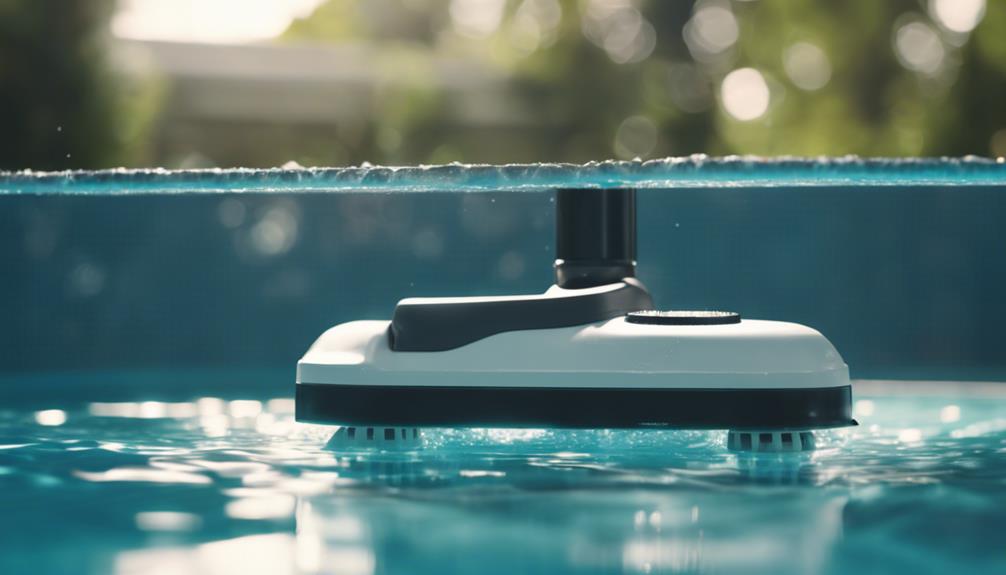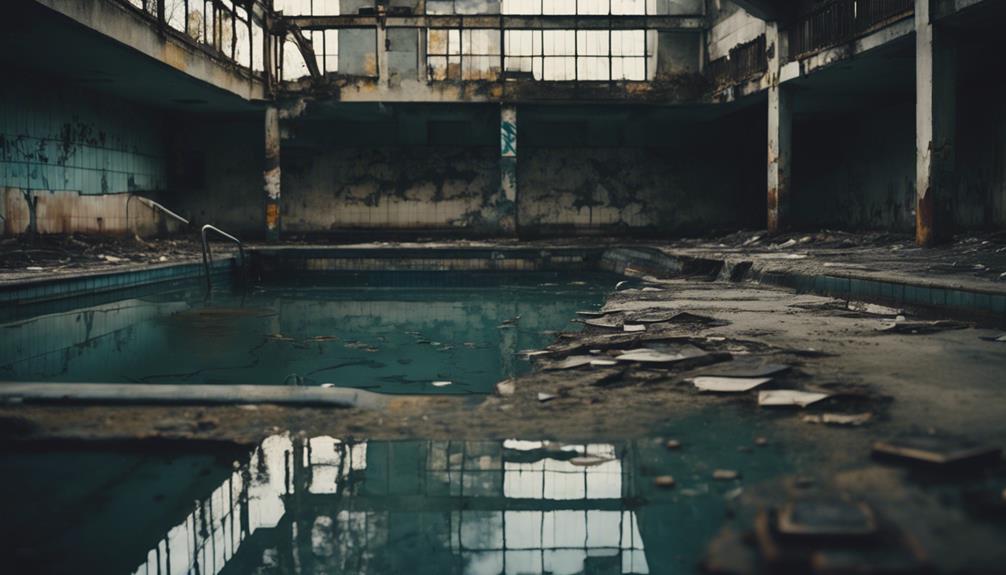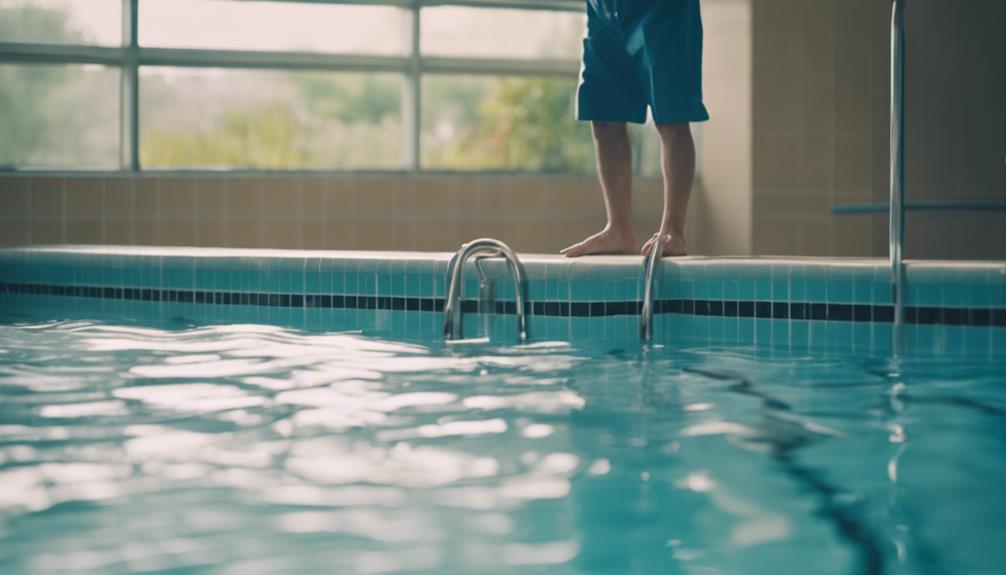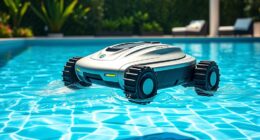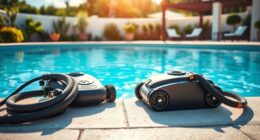Concerned about pool lights? Let’s address your worries. While it is a common belief that pool lights can be dangerous, the truth is that with proper installation, they can be perfectly safe. It is important to be cautious of faulty wiring or incorrect setup, as water can conduct electricity. Even when using LED lights, there is still a level of risk involved. It is advisable to adhere to safety standards such as using GFCIs for added protection. Regular maintenance and inspections are essential to ensure safety. Interested in learning more about safe pool lighting? Stay tuned for further information on this electrifying topic!
Key Takeaways
- Pool lights can be safe with proper installation and maintenance.
- LED pool lights are not immune to electrocution risks.
- Ground Fault Circuit Interrupters (GFCIs) enhance electrical safety.
- Regular inspections and compliance with safety standards are crucial.
- Debunk myths about the dangers of pool lights through proper maintenance.
Common Myths About Pool Lights
When it comes to pool lights, there are several common myths that can mislead pool owners about their safety. One prevalent myth is that pool lights aren't dangerous because they're designed for underwater use. However, the fact is that faulty wiring in the pool lighting system can lead to electrical leaks, posing a serious risk of electrocution.
Another myth suggests that pool lights are safe as long as they aren't touched while swimming. In reality, improper installation and maintenance of these lights can greatly increase the chances of electrical hazards occurring.
It's also a misconception to believe that LED pool lights are completely safe from the risk of electrocution. Regardless of the type of pool lights you have, ensuring proper installation and conducting regular maintenance checks are essential for guaranteeing the safety of everyone enjoying the pool.
Understanding Electrical Safety Standards

Let's talk about electrical safety standards for your swimming pool lights. Understanding these standards is super important to keep you and your loved ones safe while enjoying your pool.
Regular inspections and following the rules can help prevent any electrical mishaps.
Electrical Safety Regulations
To guarantee the safety of swimmers and prevent electrical hazards, understanding and adhering to electrical safety regulations is essential when installing swimming pool lights. Following the National Electrical Code (NEC) and local building codes is vital to confirm the proper installation and maintenance of pool lights. These regulations provide specific guidelines that must be followed to minimize the risk of electrical accidents in and around the pool area. Compliance with electrical safety standards is critical as it helps protect swimmers from potential electrocution risks that may arise from faulty pool lights. By following these regulations, a safe swimming environment is created by reducing the likelihood of electrical incidents related to pool lighting. Check out the table below for a quick overview of some key aspects of electrical safety regulations for pool lights:
| Regulation Aspect | Importance | Compliance Required |
|---|---|---|
| National Electrical Code | Ensures Safety | Yes |
| Local Building Codes | Legal Mandate | Yes |
| Maintenance Guidelines | Prevent Hazards | Yes |
Compliance With Standards
Understanding electrical safety standards is key to guaranteeing the proper installation and maintenance of swimming pool lights. When it comes to pool lighting, compliance with electrical safety standards is essential. Standards like the NFPA 70 (National Electrical Code) outline important requirements for a safe pool lighting setup.
You need to pay attention to details like proper grounding, GFCI protection, and following local building codes to keep your pool area safe and secure.
Don't forget about voltage requirements and the importance of using waterproof fixtures in your pool lighting system. These elements are vital in meeting electrical safety standards and preventing potential hazards.
It's also wise to schedule regular inspections by licensed electricians to ensure your pool lights are up to code and operating safely. By following manufacturer instructions for installation and maintenance, you can maintain compliance with electrical safety standards and enjoy a worry-free swimming experience.
Importance of Inspections
Regular inspections by licensed electricians play a critical role in ensuring compliance with electrical safety standards related to swimming pool lighting systems. These inspections are like giving your pool a thorough check-up to make sure everything is in tip-top shape.
Imagine if your pool had a hidden electrical issue just waiting to cause trouble – inspections help catch those sneaky problems before they become serious hazards.
During these inspections, licensed electricians look for faulty wiring, damaged equipment, or any other signs that could put you at risk of getting zapped. By following national and local electrical codes, these inspections help maintain a safe swimming environment for you and your loved ones.
Plus, including Ground Fault Circuit Interrupters (GFCIs) in the inspection process adds an extra layer of protection against electrical mishaps.
Misconceptions About Water and Electricity

Many people hold misconceptions about the risks associated with water and electricity in swimming pools. Let's clear up some myths to keep you safe around your pool:
- Water and electricity don't mix: Water is a great conductor of electricity, so it's important to be cautious around any electrical devices near the pool.
- Faulty pool lights are no joke: If your pool lights or wiring aren't functioning correctly, they could leak electricity into the water, creating a serious safety hazard.
- Underwater lights can be risky: Those pretty underwater lights are cool, but if not properly installed or maintained, they can pose electrical dangers in your pool.
- GFCIs are your friends: Ground Fault Circuit Interrupters (GFCIs) are like the superheroes of pool safety. They protect your lighting system and circuits from potential electrical threats.
Importance of Proper Installation and Maintenance
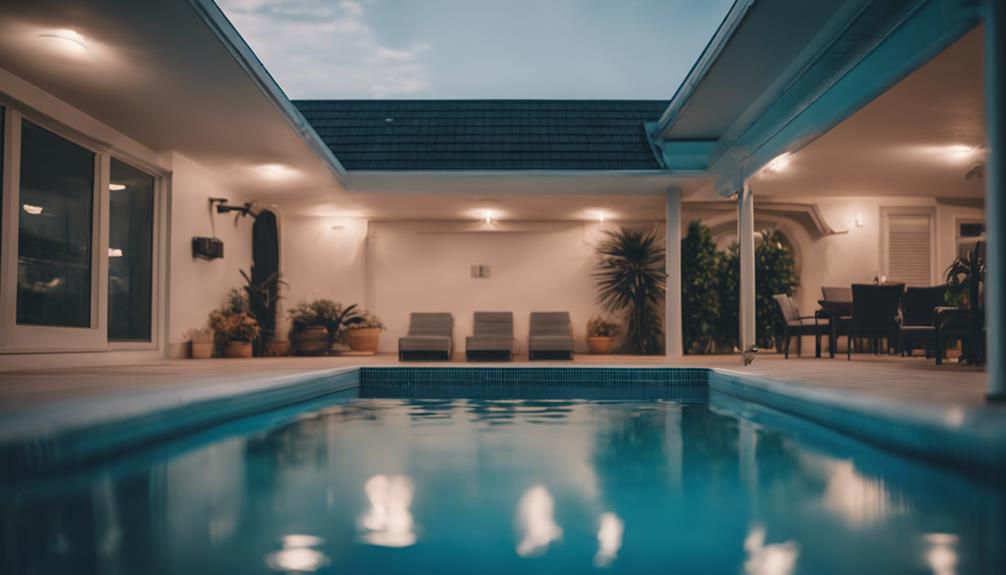
Let's discuss why proper installation and maintenance of your pool lights are essential. By ensuring everything is set up correctly and regularly checking for any issues, you can greatly reduce the risk of electrical accidents while swimming.
Installation Safety Tips
For maximum safety, always prioritize proper installation and regular maintenance of your swimming pool lights.
When it comes to installing pool lights, there are some key safety tips to keep in mind:
- Guarantee Proper Wiring: Make sure the wiring for your pool lights is done correctly to avoid electrical hazards. Faulty wiring can pose serious risks, so it's crucial to have it installed by a professional.
- Regular Inspections: Schedule regular inspections of your pool lights to check for any damage or wear. This can help prevent faults that may lead to dangerous situations.
- Utilize Ground Fault Circuit Interrupters (GFCIs): Implement GFCIs in your pool lighting system to protect against electrical leaks. This added layer of safety can prevent accidents and keep swimmers safe.
- Consult a Licensed Electrician: When in doubt, always consult a licensed electrician for pool light installation. They can ensure that the installation is done correctly, following safety regulations and minimizing risks.
Maintenance Best Practices
Regularly maintaining and ensuring proper installation of your swimming pool lights is vital for preventing safety hazards and ensuring peak functionality. Neglecting maintenance can lead to electrical hazards that pose serious risks to you and your loved ones.
By scheduling regular inspections with licensed electricians, you can guarantee that your pool lights are safe and comply with all necessary codes. Faulty wiring or damaged lights can increase the likelihood of electrical leaks, emphasizing the critical need for proper maintenance.
Installing Ground Fault Circuit Interrupters (GFCIs) is essential to protect against potential electrical hazards in your pool lighting system. Additionally, implementing pool bonding, which connects metal components, can further enhance the safety of your pool lighting installations.
Ensuring User Safety With Pool Lights

Make sure to prioritize user safety when it comes to pool lights by conducting regular inspections and maintenance. Ensuring that your swimming pool lighting is in excellent condition is key to keeping everyone safe while having a splashing time in the pool.
Here are a few tips to help you maintain a safe pool lighting system:
- Regular Inspections: Check your pool lights frequently for any signs of damage or wear. Look out for frayed wires, cracked casings, or flickering lights that could indicate a problem.
- Proper Wiring: Make sure that the wiring for your pool lights is correctly installed and insulated to prevent any electrical hazards. Faulty wiring can lead to dangerous situations, so it's crucial to address any issues promptly.
- Use GFCIs: Install Ground Fault Circuit Interrupters (GFCIs) to protect your pool lighting system from electrical faults. These devices help prevent shocks and potential electrocution by quickly shutting off power in case of a ground fault.
- Professional Maintenance: Consider hiring a professional electrician to inspect your pool lights and wiring periodically. Their expertise can help catch any potential issues early on and ensure your pool lighting is safe for use.
Debunking Pool Light Safety Myths

Guarantee you're well-informed by debunking common misconceptions surrounding pool light safety. When it comes to swimming pool safety, faulty pool lights and bad wiring are no joke.
Some might think that as long as the water and electricity stay separate, everything is fine – but that's not the case! Underwater lights and their wiring can be a big electrical hazard in pools.
So, what's the solution? Regular inspection and maintenance are key. Make sure to use Ground Fault Circuit Interrupters (GFCIs) to protect your lighting and circuits. These little devices can be a lifesaver!
Remember, water and electricity are a dangerous duo, especially when it comes to underwater light fixtures. Keep your pool safe and avoid any shocking surprises by staying on top of your pool light maintenance.
Safety first, fun second!
Frequently Asked Questions
Are Swimming Pool Lights Dangerous?
Let's talk about swimming pool lights. They can be risky if not handled right. Faulty wiring and damaged lights can lead to dangerous situations.
You see, pool lights run on electricity, so if they're not set up or taken care of properly, there's a chance of getting zapped. To keep things safe, make sure to install them correctly, maintain them regularly, and use safety precautions.
Stay safe and enjoy your swim!
Are Lights Over a Pool Safe?
Let's talk about lights over a pool. Guess what? When installed correctly, they're totally safe! They actually help you see better and create a cool vibe.
Just make sure to use lights made for wet spots to avoid any electrical issues. LED lights are awesome for pools – they save energy and come in fun colors.
Is It Dangerous to Be in a Pool During Lightning?
So, you know, being in a pool during lightning can be risky. Water conducts electricity, so if a lightning bolt strikes, it can travel through the water and zap you.
It's best to steer clear of the pool when there's a storm brewing to stay safe. Lightning and swimming don't mix well, so it's a good idea to hang out on dry land until the weather clears up.
Stay safe out there!
Are Pool Lights Grounded?
Are your pool lights grounded? Absolutely essential for safety!
Did you know that proper grounding redirects stray currents away from the pool, reducing the risk of electric shock?
Faulty grounding can spell trouble, potentially leading to dangerous situations for swimmers.
are swimming pool lights a breeding ground for algae?
Swimming pool lights can contribute to swimming pool algae dangers if not properly maintained. Water and heat around the lights create an ideal environment for algae growth. It’s important to regularly clean and inspect the lights to prevent algae from flourishing and ensure a safe and sanitary swimming environment.
Conclusion
So, next time you're chilling by the pool, remember that pool lights aren't as scary as you might think!
By following proper safety guidelines and getting your lights installed and maintained by professionals, you can enjoy your evening swims worry-free.
Don't let those myths get in the way of some well-deserved relaxation time.
Stay safe, stay informed, and keep on swimming!


